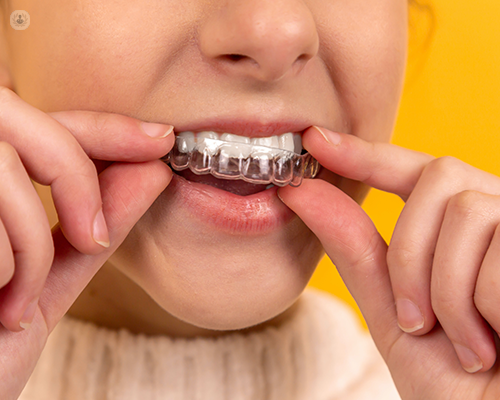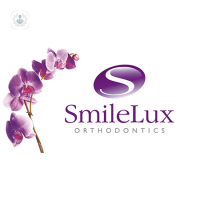Invisalign
What is Invisalign?
Invisalign is an invisible orthodontics technique that allows the correction of your teeth to produce an improved smile. Invisalign does not use metal wires as braces do, and they are virtually invisible when being worn. Special trays are custom made for your teeth, and every few weeks you wear a new tray, designed to eventually straighten your teeth.

What does Invisalign help to treat?
Invisalign helps to aesthetically improve the smile by aligning the teeth or moving their position. It can be used to treat:
- Gap teeth
- Underbite
- Crossbite
- Overbite
- Open bite
- Crowded teeth
How does Invisalign work?
Invisalign aligners move the teeth slowly, using custom-made plastic trays that are worn by the patient. Every two weeks the trays are changed to a different size, and over time the teeth eventually straighten.
Aligners must be worn at all times throughout the day and night and they should only be removed when you eat, drink or brush your teeth. These aligners are manufactured with a transparent plastic material tailored to the patient, so they fit perfectly to your teeth.
What are the advantages of Invisalign treatment?
The main benefit of Invisalign is that the aligners are transparent, and do not require having wires and metal devices in your mouth. In addition, the aligners are removable. This allows the patient to enjoy food and drink whenever they want, unlike metallic fixed appliances. They also allow you to brush your teeth easily and maintain proper oral hygiene.
Aligning the teeth to make a person’s smile more aesthetically pleasing can also help to rid them of any insecurities they may have been living with. As such, Invisalign treatment helps to boost a person’s confidence and self-esteem.
Are there any disadvantages of Invisalign?
There are no real disadvantages to Invisalign treatment given that the patient correctly follows the treatment plan. Unfortunately, the treatment will be ineffective if the patient doesn’t use the trays as instructed as they need to be worn almost consistently, apart from when eating, drinking or cleaning the teeth, to make an impact.
Invisalign can help to straighten and align the teeth, resolving issues with bite and gapped or crooked teeth. It is essential, however, that a dentist assesses the condition of the teeth before beginning the treatment, as they must be healthy in order for Invisalign to be effective. Some patients with complex dental issues may not be suitable for Invisalign treatment and may require other types of interventions.
What is the best age to get Invisalign?
There is no age limit for Invisalign treatment. Older children from six years old onwards, teens and adults are all eligible for the process. Further considerations may be necessary for adults, like additional orthodontic treatment alongside Invisalign. It is essential that a person's teeth are healthy for Invisalign to be successful.
Is Invisalign as effective as fixed braces?
Invisalign treatment offers excellent results for many patients that are equal to those achieved with treatment through fixed braces. For patients with complex alignment issues, additional treatments may be required with Invisalign which is not usually the case with fixed braces, which can treat a more comprehensive range of cases.
How long does the Invisalign process take?
When you choose to have Invisalign, complex 3D images of your teeth will be taken which are used to create your trays for the duration of the treatment. The patient should have a check-up every two to four weeks to make sure the treatment is progressing properly and to change the aligners.
A full course of Invisalign for adults, that achieves the desired effects, will take 12 months on average. However, changes may be visible from as little as two weeks into treatment but a full course of treatment and aftercare is required to ensure that these results are long-lasting.
How much does Invisalign cost?
Invisalign treatment usually costs between £1500 and £5000 depending on the extent the movement that is required and can vary from patient to patient.

Preparation for Invisalign
Before beginning Invisalign treatment, a dentist must first assess the condition of the teeth to establish that they are healthy and that treatment of this type will be beneficial and effective. Once this has been determined, treatment can begin. First, a virtual representation of the mouth is generated in three dimensions in which the expected movement of the teeth is visualised so that the custom trays can be made.
After Invisalign treatment
Once the Invisalign treatment has been completed and the desired results have been achieved, it is recommended that you wear a retainer whilst you sleep to ensure the teeth stay in place.
Which type of specialist performs Invisalign treatment?
Orthodontists specialise in Invisalign treatment and some dentists can perform Invisalign treatments based on their general knowledge of orthodontics and cosmetic dentistry.

















